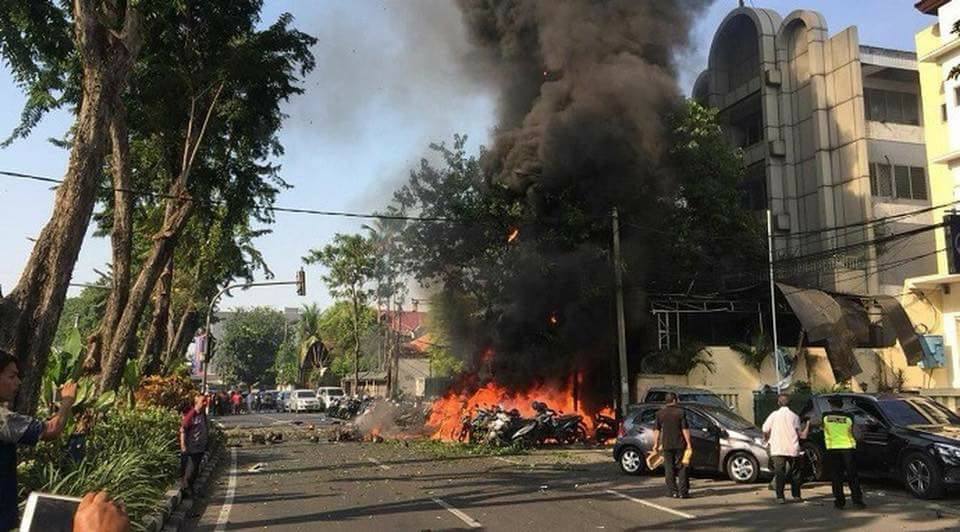Surabaya attacks: 11 killed in Indonesia church bombings

Suicide bombers have attacked three churches in Indonesia's second-largest city Surabaya, killing at least 11 people.
Around 40 others were injured in the attacks, which occurred within minutes of each other. No group has so far said it carried them out.
TV pictures showed debris scattered around the entrance of one church.
Indonesia, the most populous Muslim-majority country, has seen a resurgence of Islamist militancy in recent months.
More than 90% of Indonesians are Muslim, but there are also significant populations of Christians, Hindus and Buddhists.
The attack is the deadliest since 2005, when three suicide bombings on the resort island of Bali killed 20 people.
What happened?
The first explosion took place between services at the Santa Maria Catholic Church around 07:30 local time (00:30 GMT). Inspector General Machfud Arifin told CNN Indonesia that a motorbike was used in the attack.
According to Reuters, the second bombing targeted the cark park of a Pentecostal church. Images of the scene showed a number of burnt motorcycles.
Unconfirmed eyewitness reports say that the third attack was carried out by one or more veiled women who entered a church with children.
Officials reportedly foiled attacks against other churches.
Who's behind the attacks?
So far there has been no claim of responsibility for the attacks.
But Wawan Purwanto, of Indonesia's intelligence agency, said the Islamic State-inspired group, Jemaah Ansharut Daulah (JAD), was suspected to be behind them.
He added that the bombings were likely to be linked to an incident earlier this month, when five members of the security forces were killed during a 36-hour standoff with militant Islamist prisoners at a high security prison on the outskirts of the capital Jakarta.
Separately, police said they had killed four suspected members of JAD in Cianjur, West Java.
How has the country reacted?
Christian leaders urged calm. "We don't need to be afraid when facing terror threats. We must leave it completely to the government to handle," the head of the Indonesian Communion of Churches said in a statement on Sunday quoted by The Jakarta Post.
Indonesia's Foreign Minister Retno Marsudi condemned the attack and sent her condolences to the victims and their families.
What is the history of militancy in Indonesia?
Following the country's worst-ever attack in 2002 - when 202 people were killed in two bombings outside a bar and nightclub on Bali - authorities launched a crack-down on extremist groups.
But recent years have seen a number of attacks claimed by Islamic State (IS).
Four civilians and four attackers were killed in a series of explosions and shootings in central Jakarta in January 2016; the first attack claimed by the group.
In February this year, a number of people were injured in a sword attack at a church in Sleman, Yogyakarta. Police said that the attacker had previously tried to join IS in Syria.
BBC